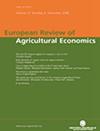在农业中回收污泥?评估意大利营养恢复的可持续性
IF 3.5
2区 经济学
Q2 AGRICULTURAL ECONOMICS & POLICY
引用次数: 0
摘要
使用混合多区域投入产出方法,我们追踪了意大利应用的污水污泥养分回收策略的可持续性足迹。然后,我们将结果与最常见的堆填做法进行了比较。总的来说,考虑到间接的全球上游效应,使用污水污泥生产有机肥料比填埋能创造更多的就业机会,减少更多的温室气体排放。相比之下,堆填区更能刺激整体经济,产生更高的间接营业额,并更多地减少能源载体的使用。最后,我们使用基于蒙特卡罗模拟的误差传播方法来解释这些结果中的不确定性。本文章由计算机程序翻译,如有差异,请以英文原文为准。
Recycling sludge in agriculture? Assessing sustainability of nutrient recovery in Italy
Abstract Using a hybrid multi-regional input–output approach, we traced sustainability footprints of a nutrient recovery strategy from sewage sludge applied in Italy. We then compared the results with the most common landfilling practice. Overall, accounting for indirect global upstream effects, using sewage sludge for organic fertiliser production generates more jobs and reduces more greenhouse gas emissions than landfilling. By contrast, landfilling stimulates the whole economy more, generating higher indirect turnover and reduces energy carrier use more. Finally, we accounted for uncertainties in these results using an error propagation method based on Monte Carlo simulations.
求助全文
通过发布文献求助,成功后即可免费获取论文全文。
去求助
来源期刊

European Review of Agricultural Economics
管理科学-农业经济与政策
CiteScore
6.60
自引率
5.90%
发文量
25
审稿时长
>24 weeks
期刊介绍:
The European Review of Agricultural Economics serves as a forum for innovative theoretical and applied agricultural economics research.
The ERAE strives for balanced coverage of economic issues within the broad subject matter of agricultural and food production, consumption and trade, rural development, and resource use and conservation. Topics of specific interest include multiple roles of agriculture; trade and development; industrial organisation of the food sector; institutional dynamics; consumer behaviour; sustainable resource use; bioenergy; agricultural, agri-environmental and rural policy; specific European issues.
Methodological articles are welcome. All published papers are at least double peer reviewed and must show originality and innovation. The ERAE also publishes book reviews.
 求助内容:
求助内容: 应助结果提醒方式:
应助结果提醒方式:


